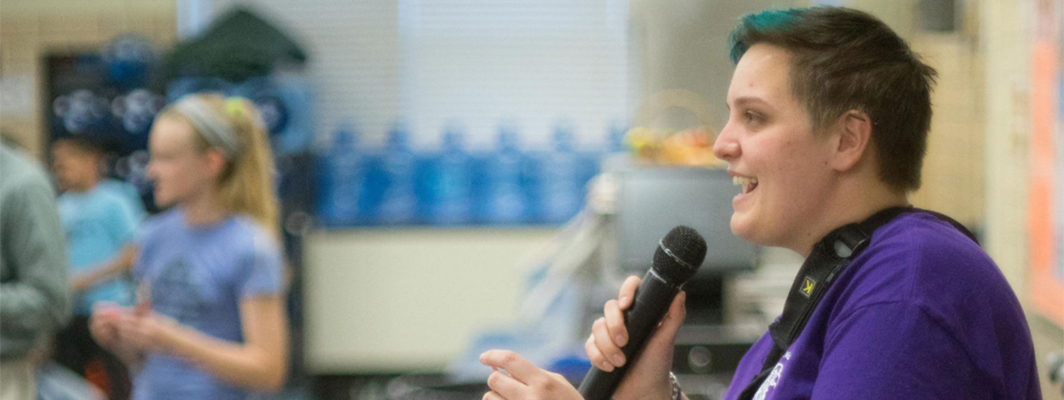
Katie’s journey as an educator began seven years ago. She describes herself as “bright-eyed and bushy-tailed” at the beginning of her career, not fully realizing the many needs of her students. Katie believes that one of the primary needs of middle school learners is metacognition — the ability to do, examine, think and reflect. She has learned that with the powerful tool of technology, she can provide students with immediate feedback which allows for immediate reflection and personalization based on what students need. Seven years ago, she says her classroom looked like a lecture hall. Now, she says her classroom is filled with students performing several different learning activities at the same time, all trying to reach beyond the standards to solve problems.
“Circles. I know you have maybe heard this over and over again, or maybe you teach middle school or high school and you just think your kids will just be ‘too cool.’ I’ve been there, I have thought that. Now, I am not talking about using emotional, touchy-feely circles for conflict management or restoration. (We do that too and it rocks, but stay with me.) I am talking about rearranging your classroom so every student can be seen, I am talking about laying ground rules for listening and speaking, and I am talking about building a community of learners that want to rise to the occasion. I use circles to connect with my students weekly. Sometimes we talk science content, and other times we just take time to hear about each others’ lives. Regardless, we all walk away feeling like we had a better day because we took time to connect and share with one another. This connects to powerful learning because powerful learning is based on principles founded in real-life problem solving and empathy. It involves teachers and students taking risks in the classroom in order to grow. Those risks can be scary, and they are far less scary for you and your students when your classroom is actually a community. Circles provide students with an easy and accessible way to feel heard, share ideas, and be brave. That is exactly what they need to do to become powerful learners.”
“As a department chair and professional development leader, The Art of Coaching Teams by Elena Aguilar helped me develop an appropriate and powerful framework for engaging adult learners. Many of us our great teachers of students, but as PD leaders, we can easily forget that we also need to be great teachers of adults. This book has shaped my department and PD meetings agendas and has helped me create conversations focused on growth and capacity building in my team.”
“…I really look forward to twenty years from now when I can hear what [students] remember about my science class. Of course, I definitely want them to remember the experiments and the cool things that we did and all the science that we learned, but more importantly, I want to hear from them that I taught them how to problem solve. That I taught them how to think critically and use their brain in ways they didn’t know they could use it before.”
“Reach out to me if you want to know more about OneNote Class Notebooks, you want to talk about inquiry and how you can use it in the classroom, or if you want to talk about connecting science to real-life through resources and technology!”

Learn more about HP Teaching Fellows.
